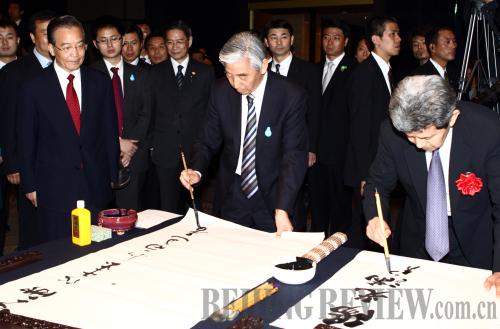|
 |
|
DIRECTION AND DEXTERITY: Chinese Premier Wen Jiabao observes acalligraphy show after meeting with representatives from Chinese and Japanese cultural communities in Tokyo on May 31 (YAO DAWEI) | China, he added, is ready to enhance its coordination with South Korea within the framework of the Group of 20 (G20) to promote the reform of the international economic governance system. South Korea will host a G20 summit in November.
While in Japan, Premier Wen and his Japanese counterpart Yukio Hatoyama agreed to re-establish a telephone hotline between the two countries' premiers. Although Hatoyama officially resigned from office on June 2, his representation of Japan's policies will remain in effect.
Regarding territorial disputes in the East China Sea, Wen said China and Japan should implement their principled consensus achieved in 2008 on jointly developing oil and gas resources in the East China Sea, while strengthening maritime crisis management to avoid conflicts.
Wen and Hatoyama agreed that the two countries would establish communication links between their defense deployments in maritime arenas and sign an agreement on maritime rescue operations.
Wen announced that China would invite 1,000 young people from Japan to visit the World Expo in Shanghai. He welcomed Japanese earthquake rescuers to revisit Wenchuan, Sichuan Province, to witness reconstruction progress in the area leveled by a devastating earthquake in May 2008. China will also arrange visits for 100 Japanese media and social science professionals to China each year over the next five years.
At the same time, Wen proposed that the two countries jointly pursue major projects in green technologies, energy and environmental protection, while enhancing macroeconomic policy coordination.
China is Japan's largest trading partner, biggest export market and primary destination of outbound investment, while Japan is China's third largest trading partner and second biggest source of foreign investment, noted Chinese Vice Foreign Minister Zhang Zhijun.
Likewise, China represents South Korea's largest trading partner, biggest export market and largest source of imports. South Korea is China's fourth largest trading partner.
In 2009, two-way trade between China and Japan and between China and South Korea totaled $228.8 billion and $156.2 billion respectively, with both Japan and South Korea running a trade surplus with China, according to China's official statistics. n
Joint Endeavors
In a speech at a China-Japan-South Korea business luncheon in Jeju, South Korea, Chinese Premier Wen Jiabao made a four-point proposal on deepening regional economic integration:
- Expanding regional trade. China, Japan and South Korea should study the feasibility of establishing a trilateral free trade area and make sure to finish this job by 2012. They should also strengthen cooperation in sectors such as logistics, customs service and quality inspection, push ahead the Doha Round negotiations of the World Trade Organization and oppose any form of protectionism.
- Creating a sound investment environment. In their ongoing negotiations for a joint investment agreement, the three countries should give due consideration
to each other's concerns and interests and also be flexible so as to achieve a balanced, pragmatic and win-win result for all.
- Exploring models of sustainable development. The three countries should strengthen all-around cooperation in the development of new technologies designed to lower energy consumption and boost energy efficiency.
- Safeguarding regional financial stability. Top priorities for now are to implement and improve the Chiang Mai multilateral mechanism and to push ahead efforts to develop the Asian bond market.
(Source: Xinhua News Agency)
| 